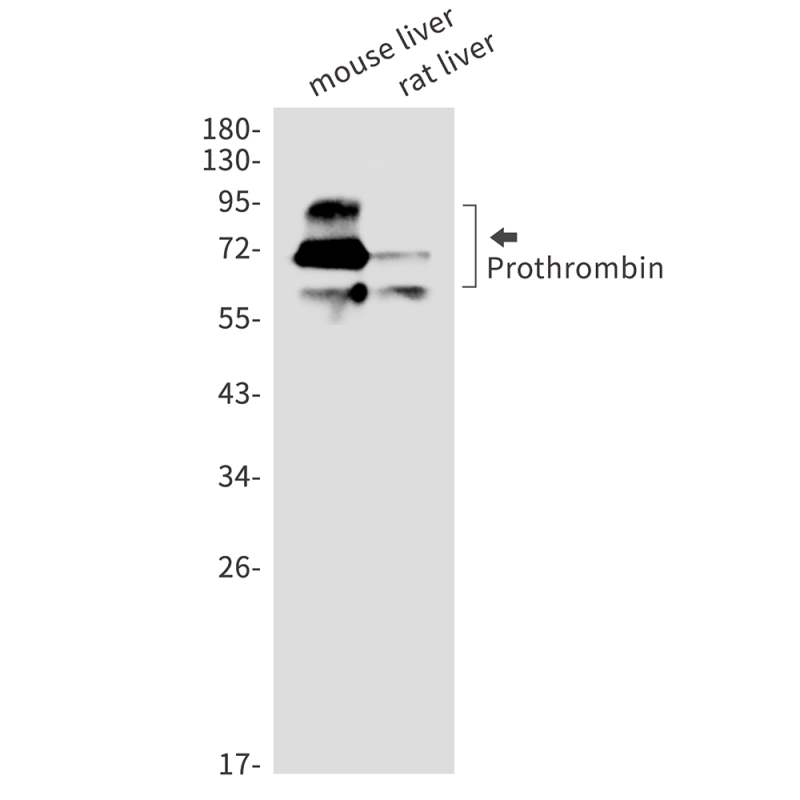
| WB | 1/500-1/1000 | Mouse,Rat |
| IF | 咨询技术 | Mouse,Rat |
| IHC | 1/50-1/100 | Mouse,Rat |
| ICC | 技术咨询 | Mouse,Rat |
| FCM | 咨询技术 | Mouse,Rat |
| Elisa | 咨询技术 | Mouse,Rat |
| Aliases | Cf2; FII; Cf-2 |
| Entrez GeneID | 14061 |
| WB Predicted band size | Calculated MW: 70 kDa; Observed MW: 70 kDa |
| Host/Isotype | Rabbit IgG |
| Antibody Type | Primary antibody |
| Storage | Store at 4°C short term. Aliquot and store at -20°C long term. Avoid freeze/thaw cycles. |
| Species Reactivity | Mouse,Rat |
| Immunogen | Recombinant protein of mouse Prothrombin |
| Formulation | Purified antibody in TBS with 0.05% sodium azide,0.05%BSA and 50% glycerol. |
+ +
以下是3篇关于Prothrombin抗体的参考文献及摘要概括:
---
1. **文献名称**: *Anti-prothrombin antibodies and their relation with thrombosis and lupus anticoagulant*
**作者**: Galli, M. 等 (2003)
**摘要**: 该研究探讨抗凝血酶原抗体(aPT)与血栓事件及狼疮抗凝物(LA)的关联,发现aPT与静脉血栓风险显著相关,尤其在合并LA阳性患者中,提示其可作为抗磷脂综合征(APS)的辅助诊断标志物。
---
2. **文献名称**: *Clinical significance of anti-prothrombin antibodies in autoimmune diseases*
**作者**: Pengo, V. 等 (2010)
**摘要**: 研究分析了系统性红斑狼疮(SLE)和APS患者中抗凝血酶原抗体的临床意义,发现其与反复流产及动脉血栓形成相关,并建议将其纳入抗磷脂抗体综合征的实验室诊断标准。
---
3. **文献名称**: *Prothrombin antibodies in pediatric thrombosis: A case-control study*
**作者**: Male, C. 等 (2015)
**摘要**: 通过病例对照研究,揭示儿童血栓形成患者中抗凝血酶原抗体的阳性率显著高于健康对照组,提示此类抗体可能是儿童血栓形成的潜在生物标志物,尤其与感染或炎症状态相关。
---
4. **文献名称**: *Mechanisms of anti-prothrombin antibody-mediated coagulation dysfunction*
**作者**: Agmon-Levin, N. 等 (2017)
**摘要**: 该研究通过体外实验阐明抗凝血酶原抗体通过干扰凝血酶原转化为凝血酶的过程,破坏凝血级联反应,导致血栓前状态或异常出血的双重病理机制。
---
这些文献覆盖了抗凝血酶原抗体的临床相关性、诊断价值及机制研究,适用于理解其在自身免疫病和血栓中的角色。如需具体文章链接或补充其他研究,请进一步说明。
Prothrombin antibodies, also called antiprothrombin antibodies, are autoantibodies targeting prothrombin (Factor II), a key protein in the blood coagulation cascade. These antibodies are primarily associated with antiphospholipid syndrome (APS), a thrombophilic autoimmune disorder characterized by arterial/venous thrombosis and pregnancy complications. Two main types exist: those directed against prothrombin itself (aPT-A) and those targeting phosphatidylserine-prothrombin complexes (aPS-PT).
First identified in the 1950s, prothrombin antibodies gained clinical significance when linked to lupus anticoagulant (LA) activity, a laboratory phenomenon causing prolonged phospholipid-dependent clotting tests. Unlike other antiphospholipid antibodies (e.g., anticardiolipin), prothrombin antibodies are detected through ELISA or specialized coagulation assays. They contribute to thrombotic risk by potentially interfering with coagulation regulation, promoting platelet activation, or disrupting the anticoagulant activity of annexin A5.
Clinically, IgG prothrombin antibodies show stronger association with thrombosis than IgM isotypes. While not yet included in formal APS diagnostic criteria, they serve as supplementary markers in seronegative APS cases. Their presence correlates with recurrent miscarriages, stroke risk, and systemic lupus erythematosus (SLE) comorbidities. Research continues to clarify their pathogenic mechanisms and optimize standardized detection methods for improved diagnostic utility.
×